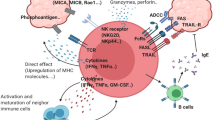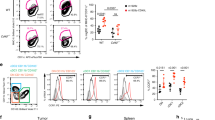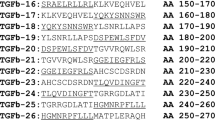Abstract
It has been reported that the ratio of CD4+ to CD8+ T cells has no bias in a few class I major histocompatibility complex (MHC-I)-restricted T-cell receptor (TCR)-transgenic mice specific for alloantigens or autoantigens, in which most CD4+ T cells express an MHC-I-restricted TCR. In this study, we further showed that more than 50% of CD4+ T cells in MHC-I-restricted P1A tumor antigen-specific TCR (P1ATCR)-transgenic mice could specifically bind to MHC-I/P1A peptide complex. P1A peptide could stimulate the transgenic CD4+ T cells to proliferate and secrete both type 1 helper T cell and type 2 helper T cell cytokines. The activated CD4+ T cells also showed cytotoxicity against P1A-expressing tumor cells. The analysis of TCR α-chains showed that these CD4+ T cells were selected by co-expressing endogenous TCRs. Our results show that CD4+ T cells from P1ATCR transgenic mice co-expressed an MHC-I-restricted transgenic TCR and another rearranged endogenous TCRs, both of which were functional.
This is a preview of subscription content, access via your institution
Access options
Subscribe to this journal
Receive 12 digital issues and online access to articles
$119.00 per year
only $9.92 per issue
Buy this article
- Purchase on Springer Link
- Instant access to full article PDF
Prices may be subject to local taxes which are calculated during checkout





Similar content being viewed by others
References
Kisielow P, Bluthmann H, Staerz UD, Steinmetz M, von Boehmer H . Tolerance in T-cell-receptor transgenic mice involves deletion of nonmature CD4+8+ thymocytes. Nature 1988; 333: 742–746.
Pircher H, Burki K, Lang R, Hengartner H, Zinkernagel RM . Tolerance induction in double specific T-cell receptor transgenic mice varies with antigen. Nature 1989; 342: 559–561.
Morgan DJ, Liblau R, Scott B, Fleck S, McDevitt HO, Sarvetnick N et al. CD8+ T cell-mediated spontaneous diabetes in neonatal mice. J Immunol 1996; 157: 978–983.
McGargill MA, Mayerova D, Stefanski HE, Koehn B, Parke EA, Jameson SC et al. A spontaneous CD8 T cell-dependent autoimmune disease to an antigen expressed under the human keratin 14 promoter. J Immunol 2002; 169: 2141–2147.
Asnagli H, Schmitt-Verhulst AM, Guimezanes A . Class I- and class II-reactive TCRs coexpressed on CD4+ T cells both trigger CD4/CD8-shared and CD4-unique functions. J Immunol 1997; 158: 4533–4542.
Graser RT, DiLorenzo TP, Wang F, Christianson GJ, Chapman HD, Roopenian DC et al. Identification of a CD8 T cell that can independently mediate autoimmune diabetes development in the complete absence of CD4 T cell helper functions. J Immunol 2000; 164: 3913–3918.
Shanker A, Auphan-Anezin N, Chomez P, Giraudo L, van den Eynde B, Schmitt-Verhulst AM . Thymocyte-intrinsic genetic factors influence CD8 T cell lineage commitment and affect selection of a tumor-reactive TCR. J Immunol 2004; 172: 5069–5077.
Zamoyska R . CD4 and CD8: modulators of T-cell receptor recognition of antigen and of immune responses? Curr Opin Immunol 1998; 10: 82–87.
Daniels MA, Jameson SC . Critical role for CD8 in T cell receptor binding and activation by peptide/major histocompatibility complex multimers. J Exp Med 2000; 191: 335–346.
van den Eynde B, Lethe B, van Pel A, de Plaen E, Boon T . The gene coding for a major tumor rejection antigen of tumor P815 is identical to the normal gene of syngeneic DBA/2 mice. J Exp Med 1991; 173: 1373–1384.
Uyttenhove C, Godfraind C, Lethe B, Amar-Costesec A, Renauld JC, Gajewski TF et al. The expression of mouse gene P1A in testis does not prevent safe induction of cytolytic T cells against a P1A-encoded tumor antigen. Int J Cancer 1997; 70: 349–356.
Sarma S, Guo Y, Guilloux Y, Lee C, Bai XF, Liu Y . Cytotoxic T lymphocytes to an unmutated tumor rejection antigen P1A: normal development but restrained effector function in vivo. J Exp Med 1999; 189: 811–820.
Lethe B, van den Eynde B, van Pel A, Corradin G, Boon T . Mouse tumor rejection antigens P815A and P815B: two epitopes carried by a single peptide. Eur J Immunol 1992; 22: 2283–2288.
Casanova JL, Romero P, Widmann C, Kourilsky P, Maryanski JL . T cell receptor genes in a series of class I major histocompatibility complex-restricted cytotoxic T lymphocyte clones specific for a Plasmodium berghei nonapeptide: implications for T cell allelic exclusion and antigen-specific repertoire. J Exp Med 1991; 174: 1371–1383.
Harding FA, Allison JP . CD28-B7 interactions allow the induction of CD8+ cytotoxic T lymphocytes in the absence of exogenous help. J Exp Med 1993; 177: 1791–1796.
Malissen M, Trucy J, Jouvin-Marche E, Cazenave PA, Scollay R, Malissen B . Regulation of TCR alpha and beta gene allelic exclusion during T-cell development. Immunol Today 1992; 13: 315–322.
Gascoigne NR, Alam SM . Allelic exclusion of the T cell receptor alpha-chain: developmental regulation of a post-translational event. Semin Immunol 1999; 11: 337–347.
Acknowledgements
This work was supported by grants from the National Natural Science Foundation of China under contract no. 30771968.
Author information
Authors and Affiliations
Corresponding authors
Rights and permissions
About this article
Cite this article
Han, X., Ye, P., Luo, L. et al. The development and functions of CD4+ T cells expressing a transgenic TCR specific for an MHC-I-restricted tumor antigenic epitope. Cell Mol Immunol 8, 333–340 (2011). https://doi.org/10.1038/cmi.2011.14
Received:
Revised:
Accepted:
Published:
Issue Date:
DOI: https://doi.org/10.1038/cmi.2011.14



